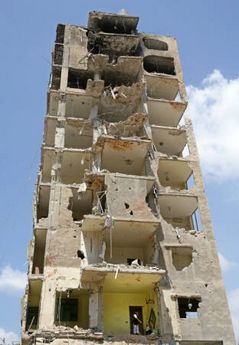 Israel agreed to lift its air and sea blockade on Lebanon on Thursday at 6 pm local time (1500 GMT) Thursday, a government statement announced. The decision came after guarantees from the United Nations and the United States that international troops would take up positions at the sea and air port in Beirut.
Israel agreed to lift its air and sea blockade on Lebanon on Thursday at 6 pm local time (1500 GMT) Thursday, a government statement announced. The decision came after guarantees from the United Nations and the United States that international troops would take up positions at the sea and air port in Beirut.
Israeli Prime Minister Ehud Olmert received the assurances from US Secretary of State Condoleezza Rice and UN Secretary General Kofi Annan, the statement said. According to the statement, German experts are due to arrive with special equipment at the Beirut International Airport later Wednesday, while German naval forces are to patrol the Lebanese shores starting within an estimated two weeks. Until their arrival, the sea patrols will be carried out by Italian, French, British and Greek naval forces, the statement said.
The decision was the result of indirect negotiations between Israel and the Lebanese government under mediation by the US and UN, Israeli media reported. Earlier Wednesday, Israeli military sources admitted that Israel had not choice but to lift the sea and air blockade, because it had no means to enforce it. ‘We regret the fact, but we have no choice. We do not want to hit civilian planes,’ a military official told Deutsche Presse Agentur dpa, when asked what Israel would do if civilian aircraft broke the air blockade.
Israel imposed the air and sea embargo on its northern neighbour at the start of its 33-day war with Hezbollah, which erupted July 12 following the abduction by the group of two Israeli soldiers in a cross-border raid.
Officials said the aim of the embargo was to prevent the radical Shiite movement from rebuilding its rockets arsenal.
Germany has taken on itself the mission of helping enforce the international weapons embargo on Hezbollah, because it is not sending ground troops to southern Lebanon to bolster the United Nations force overseeing the fragile truce in the region.
German Chancellor Angela Merkel explained the German refusal to send ground troops to Lebanon by saying that German soldiers must never be put in a position where they might even accidentally shoot at Israelis.
In a speech to parliament, she underlined her government’s pledge to send naval forces to serve off Lebanon’s coast.
Merkel, while not mentioning the Holocaust, said Germany had a special obligation to ensure Israel’s security.
‘It has to be prevented – even if it is unintentional – that German soldiers ever shoot at Israelis,’ Merkel said.
The United Nations is expanding its United Nations Interim Force in Lebanon (UNIFIL) peacekeeping force to 15,000 troops under terms of a Security Council resolution which last month ended the fighting between Israel and Hezbollah.
The force is headed first by France, and from March 2007 Italy will take over command.
Greek government spokesman Theodoros Rousopoulos told journalists in Athens that Greece would send an armed frigate to help patrol the Lebanese coast in the next few days.
Earlier Wednesday, French Foreign Affairs Minister Philippe Douste-Blazy said that France was also prepared to help patrol the Lebanese coast.
‘If the Lebanese government wants us to help in the surveillance, we can do it,’ Douste-Blazy told Radio Monte Carlo.
‘We cannot demand that the Israelis lift their (air and sea) blockade if they are not sure that arms will not come in via ports and airports,’ Douste-Blazy said.



